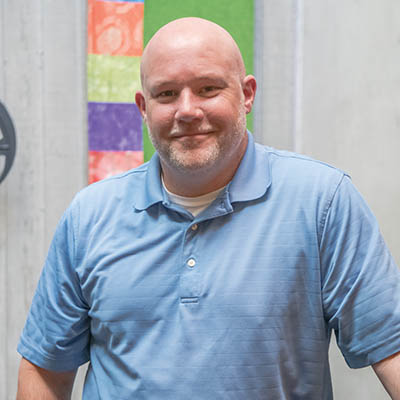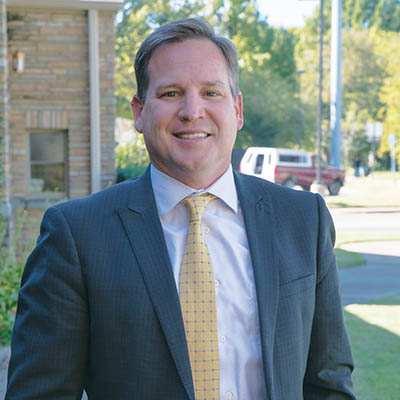Rethinking the Republican resistance
On the importance of conversations across party lines
Rev. Alexis Carter
I am checking Facebook and refreshing my email. This means I am avoiding something. Perhaps you know the feeling? When you’ve just reached the hardest part of your task, and you find yourself resisting it?
“Resistance” is an interesting word. There are a lot of ways to define it, and everyone, it seems, defines it differently.
Danny Stockstill, the pastor at Brookside Baptist Church and a Republican candidate in Oklahoma’s 1st Congressional District, told me, “In the current climate the idea ‘resist’ means to stop or prevent or bring to a halt. And I don’t think that’s positive ... Even if you’re successful, then you have to gain momentum to get moving again.”
Only a few blocks away, in his office at the Fellowship Congregational Church, Reverend Chris Moore had a very different take (though to be clear, he also intimated that his church is progressive and leans left).
“Here’s an analogy,” Moore told me. “When you go rafting, the guide will tell you they are in control of the boat. That’s not really true … The river is really in control of the raft. What resistance is, is when you fall out of the boat and into the river … you resist long enough for someone to help you, or to get to a quieter part of the river where you can get out … it may not feel like success when you’re just keeping your head above water, but you’re breathing. You’re doing the most important thing.”
John Roberts, the Chairman of the Oklahoma Young Republicans, made a similar comment about the tenacity required to work with politics and government. “There has always been this resistance to authority,” Roberts said. “That was the result of a two-party system. Change is slow ... This is not an activity that gets you a lot of instant gratification.”
Reverend Alexis Carter at the Metropolitan Baptist Church said resistance is pushing back against evil ideas while pulling people close, “and letting them pull me in, too,” she added.
When I drove to these interviews, my car was met with the literal resistance the atmosphere provides. I find it compelling that there is resistance “where the rubber meets the road.” That as soon as we put our theories to a practical test, there is a natural inclination to push back, to fit more neatly into the groove of normalcy. I am, it occurs to me, resisting the possibility that my interviews have been the practical test of the topic we were discussing.
A part of me set out to tell a fairly specific story. One more like what we’re seeing emerge in national headlines, like Senator Flake’s “kamikaze speech” and Senator Corker’s remarks about Trump’s honesty or lack thereof. But that isn’t exactly the story that has emerged.
I entered this assignment with a set of assumptions about the people I would be talking to. But what I was told, repeatedly, is that the idea people are resisting is that we can rely on those assumptions to guide our decision-making. It’s a lazy way to move through the world, I was reminded—and also an unfulfilling one. Rev. Carter would not even tell me her political affiliation, which makes writing this incrementally harder for me, but drives home her point that party affiliations really only “help us put people in boxes… [And] we’re so much more complex than that.”
Even Roberts, who works with people in his own party, emphasized the importance of not making assumptions about where people are in life. He described the challenge of his position as, “trying to bring everyone together and meet everyone where they are. You can’t put everyone into neat little cookie-cutters and assume everything is going to work … The first thing that has to be the goal is understanding where everybody is and being able to communicate effectively. When we devolve to rhetoric for rhetoric’s sake, we don’t influence anyone.”
Besides its lack of productivity, I kept hearing, political polarization is a socially acceptable way to sell each other short. It’s a habit that everyone I spoke with saw as negatively impacting the whole country—and one they are resisting in their own ways.
Roberts told me he makes a point of following people on social media with whom he doesn’t usually agree, so that when it comes time to discuss issues, he knows what they might have in common and can work from there. Stockstill says part of his strategy, if elected, will be to foster relationships with Democrats in Washington so that they can identify and work toward common goals. When he first started at Brookside, he told me, one of the first calls he made was to Planned Parenthood to ask how they could work together.
 Moore told me about a dinner organized by the Tulsa Metropolitan Ministry called an Intersection Dinner, where people from various backgrounds and ideologies get together to find out just how much they have in common. The rules of the road also apply at this dinner: “You may not know who’s in the car next to you, but you know you have to stay in your lane,” Moore said.
Moore told me about a dinner organized by the Tulsa Metropolitan Ministry called an Intersection Dinner, where people from various backgrounds and ideologies get together to find out just how much they have in common. The rules of the road also apply at this dinner: “You may not know who’s in the car next to you, but you know you have to stay in your lane,” Moore said.
Everyone I spoke with shared this desire to bridge the gap between people of different backgrounds and experiences in a way that could help us all work together instead of against each other. But they also recognized the challenges to making that desire a reality.
“It’s an imagination problem,” Carter said over coffee. “[People] can’t even imagine that there could be joy and peace in relationships with people who aren’t like them. With people who don’t share the same religious views [or] political views as you. Our relationships become insular and our communities become insular.”
On the other side of town, Stockstill agreed. When I asked him how we could encourage Congress to work across the aisle, he said, “We tend to focus on the things we don’t agree upon ... [but] deep down we want better education for our kids, we want job security, we want to be able to support our families with the resources we have … that’s the same on both sides.”
Roberts told me his idea of what it means to be Republican: (naturally) limited government, but also “being able to give everyone the opportunity and freedom to pursue their own American dream. I don’t … assume what the American dream means to me is what the American dream means to my neighbor.”
Given the malcontent and factions ever-forming between and within parties, I asked Roberts if two parties were enough. He said he thought they were.
“Even if there are factions within each group, they come together to make things happen and get things done,” he said.
By the same logic, though, I wondered if two parties were too many. I wondered if we could we do away with the labels that, for so many, simply mean “friend” or “foe.”
It can be hard to remember that our government has never promised the right to happiness, but we have been promised the right to pursue it. And it is fear of losing that right that has perhaps driven such a deep wedge between us. No matter what side of the debate you’re on—gay marriage, gun ownership, healthcare, et al—the fear that there isn’t enough America to go around, that laws made to protect one person’s interests will be at the expense of our own, is a fear we all share.
“Sometimes my initial pushing-back is fear,” Carter said of the human tendency to resist change. “It’s a fear of what that might mean for me, or a fear for what that might mean for the way I do life … my sense of tradition. Sometimes … if I hear something and my defenses go up and I feel a need to attack, it’s because I’m fearful.”
Moore built on that idea: “People who look like me—white, straight, married guys with 2.3 kids—are not going to be the majority in 30, maybe 40 years,” he said. “And a lot of what you see, in terms of the anxiety and the stress, comes from people who look like me seeing that we’re not going to define normal anymore.”
In the wake of WWI, Warren G. Harding ran for president under the campaign promise of a “Return to Normalcy.” Economies were depressed. Citizens were tired. The pursuit of happiness, I imagine, felt like a distant luxury. There are many who feel this way today, who believe there was some historical time when America was great and that we’ve drifted away from it.
Senator Flake echoed this idea in his speech when he decried the “new normal” as presented by the national leadership. Yet others feel that the pursuit of happiness was a luxury never made available to them. Those people fell out of the raft a long time ago and have been resisting the powerful current of the old normal all this time. People who believe that a new normal could be even better. At this point, even I’m not sure which side I’m describing. Probably we all want to believe that the future could be better than today.
There is a powerful but largely ignored common goal here: the desire for our country to live up to its reputation of greatness. As citizens, we don’t have to leave what greatness looks like up to Congress, or the executive branch. We have the privilege and responsibility of deciding that for ourselves in our homes and our communities.
 “We’ve been taught to hate each other,” Stockstill said. “Maybe it’s just getting out of our own selves. Maybe as a Republican, go to a luncheon with the Tulsa Democrats and just listen with the idea of finding one piece or idea you agree with.”
“We’ve been taught to hate each other,” Stockstill said. “Maybe it’s just getting out of our own selves. Maybe as a Republican, go to a luncheon with the Tulsa Democrats and just listen with the idea of finding one piece or idea you agree with.”
I think that applies to Democrats as well. And having just done this, I recommend it.
Among the many assumptions I began this article with was that the problem is Trump, or at the very least the way he communicates. And frustration with his toxic rhetoric was a common thread throughout my interviews. But I’m not going to change the way Trump talks or tweets, and if anything has been made clear by Flake and Corker, it’s that Republicans won’t, either. But what we can change is ourselves.
Who knows; maybe we’ll make America a different kind of great in the process.


.jpg)
.jpg)
